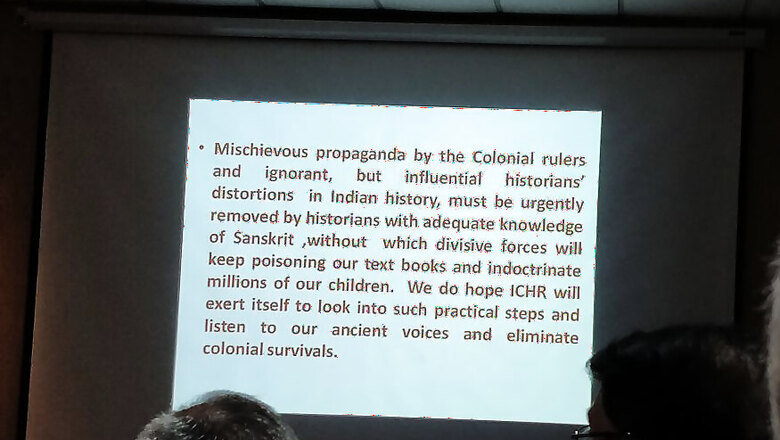
views
New Delhi: Indian Council of Historical Research has organised a conference to clear “distortions” in Indian history.
The three-day conference, titled “Indian History: Emerging Perspectives”, was inaugurated on Monday, coinciding with the first day of ICHR’s new chairman, Arvind Jamkhedkar.
The keynote address was delivered by Ramachandran Nagaswamy, a historian, archaeologist and epigraphist, who is known for his work on temple inscriptions and art history of Tamil Nadu. He has been awarded with the Padma Bhushan.
Nagaswamy said that dharma was not introduced by the Mauryan emperor Asoka, contrary to what ‘left historians’ have written. He went on to say that the thought had been developed earlier and that there were many kings before him who wanted the people to follow a dharmic path.
He also said that modern India dismissed dharma as a religious term, and introduced an imported term secularism, which has been ‘pumped’ into our minds.
“Dharma was not introduced by Asoka Maurya but is a thought of all ancient thinkers. The dharma gunas as preached by Asoka are found in Taittriya Upanishad, teachings of Buddha, Manu and Gautama who were considered to have come much earlier to Asoka,” he said.
He talked about Manu’s dharma and said, “Manu defined dharma as something adored by learned scholars who are of sterling conduct, and who always remain impartial without pride and prejudices and who listen to inner voice is called dharma. This is the foremost definition given by Manu. Which has nothing to do with religion. But when we talk of secularism in modern times, we mean only anti-Indian ‘ism’ and portray minority virtuosity.”
“Historians like Romila Thapar hold a view that Asoka expounded an idea new to Indian political and social theory, that Asoka did not see dharma resulting from the good deeds that were inspired by formal religious beliefs but as conformity to social ethics. According to these historians, Asoka’s dharma is not Buddhist in nature but it was a new and original idea to which he gave a definition. It is a distorted idea as Asoka himself repeatedly says (in his edicts) that what he thought was not his own, but the ancient paurani prakriti,” he added.
Nagaswamy said that in this time and age, we must listen to the voice of ancient Indian leaders like Asoka in “whose time there was all-round prosperity and humanism”.
ICHR as defined the theme of the conference is to talk about the “distortion of Indian History and how it was mutilated by a colonial perspective and motivation to belittle the achievements of this civilization and create a schism between communities.”
“Some of the colonial prejudices and stereotypes have persisted in post-colonial historiographies of India right up to this day, despite claims of ushering in ‘scientific history’,” it added.
The conference aims to “providing the much-needed corrective to the distortions and speculations of colonial historiography,” it said
The event was coordinated by Dr Michel Danino, Indologist and guest professor, IIT Gandhinagar and the member secretary of ICHR Rajaneesh Kumar Shukla.
“This is a very important conference of ICHR – an initiation towards history writing in the right direction. I am not saying that past direction was wrong but righteousness as a concept should always be taken care of. This conference is a step towards restoration of history from the historians having colonial perspective,” Shukla said.
“In the past attempts achievements about civilization were belittled by those historians, damage done before independence, after independence and continues till now. Sincerely believe that this three days conference brings us to new scientific investigation and recent studies based on originals historical sources which will encourage us think in right perspective,” he added.

















Comments
0 comment